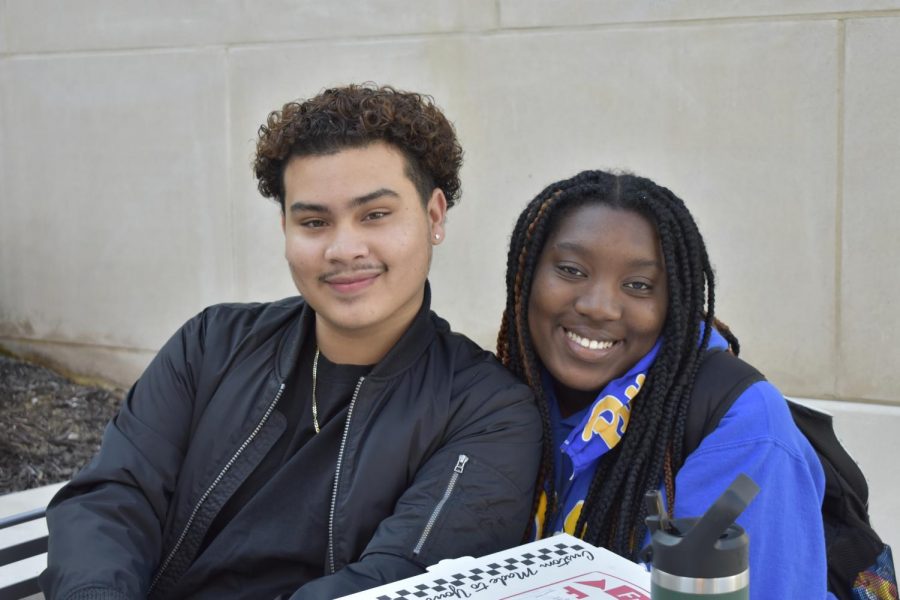Students react to Gainey’s election as first Black mayor of Pittsburgh
Romita Das | Senior Staff Photographer
Jacob Santiago, left, a first-year media and professional communications major, and Trinity Johnson, a first-year biology major on the pre-med track in the courtyard of the William Pitt Union.
November 11, 2021
Drew King said this year’s historic election is a step forward for Pittsburgh. King, communications director of Pitt College Democrats, said the group is “thrilled” to see Gainey as the first Black mayor of Pittsburgh.
“We were thrilled he won by a pretty significant margin,” King, a senior political science major, said. “Naturally, having the first Black mayor of Pittsburgh elected was big for our club this semester.”
Pennsylvania’s municipal election took place on Nov. 2 with seats from the city to state level on the ballot. Pitt students had the chance to vote at several polling locations on or near campus including Posvar Hall, the William Pitt Union and Soldiers and Sailors Memorial Hall & Museum.
Ed Gainey and Tony Moreno both ran for mayor in the local election. According to the latest numbers on Wednesday from Allegheny County, Gainey leads by more than 29,000 votes, or 71% of the vote compared to Moreno’s 29%. Gainey’s platform includes demilitarizing police equipment and training, mental health reforms, community policing strategies and banning solitary confinement.
William Beddick, a second-year English writing and political science major, said he voted “for the winner.” He said Gainey becoming Pittsburgh’s first Black mayor is a great outcome of the election.
“I think it’s a great outcome, the best outcome it can be, having the first Black mayor of Pittsburgh is such a feat,” Beddick said. “It’s terrible that it took so long for any type of diversity in office, but I think it’s so great nonetheless.”
King worked with his organization and other groups like Pitt Votes to get students to vote in the municipal election. He said while the Democratic candidate won in this election, voters must continue to work hard to ensure similar results in the future.
Jacob Santiago, a first-year media and professional communications major, said it took a while for a person of color to reach the mayor’s office, but is happy about the outcome nonetheless.
“It took a long time for a person of color to become the mayor, but as long as we’re moving forward and power to the people, and unity for Pittsburgh in general,” Santiago said. “So I’m happy that someone different is in power right now, for everyone.”
Trinity Johnson, a first-year biology major on the pre-med track, agreed with Santiago and said she hopes Gainey can make great changes once he takes office.
“I’m also happy too, like power to the people,” Johnson said. “And I hope there’s going to be great changes in Pittsburgh.”
Both Santiago and Johnson said they just turned 18 — the legal age to vote — but they plan on voting in the next local and state elections.
Pennsylvania’s 2022 primary elections are set to take place on May 17. Voters can decide the general election candidates for positions such as governor of Pennsylvania, state senators in electoral classes one and three and candidates for the U.S. House of Representatives, among others.
King said while members of the Pitt College Democrats canvassed for Gainey throughout his campaign, the mayoral race was not the only one on the group’s radar. He said the College Democrats also focused on the judicial election due to the number of candidates running for a spot on the Allegheny County Court of Common Pleas.
“Our club is concerned with the losses seen in blue states like Virginia and New Jersey,” King said, “We know that people are worried that Pennsylvania will have a similar issue next year in the race for governor.”
Beddick said everyone — especially students — can benefit from the outcomes of local elections. He said local elections “aren’t talked about enough.”
“It’s all local, so all the things they are doing are directly benefiting us as students and as the Pittsburgh community,” Beddick said. “So these elections are really talking about the community and the city that we live in versus the presidential elections.”
Daphne Plantner, a second-year environmental science major and Pitt Votes fellow, said she works with Pitt Votes to facilitate greater voter registration and engagement on campus, especially during local elections.
“This mission was especially important for this election as it was not a presidential election,” Plantner said. “Many students did not even know an election was happening, but there are no off years — every year is an election year.
Plantner added that the world of voting can be confusing and complicated, especially during non-presidential elections. She said she tried to raise awareness about the importance of voting through outreach with first-year students in large lectures and residence halls.
“While it is difficult to get as much voter engagement during non-presidential election years, we tried to reach as many students as possible in many different ways,” Plantner said.
King said this past election proved Pennsylvania’s Democratic party is still strong.
“Pennsylvania has the power to make their commonwealth better through Democratic leadership,” King said.
Natalie Frank contributed reporting.



